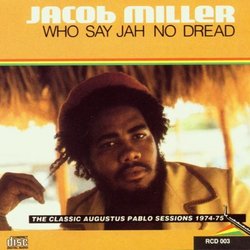| All Artists: Jacob Miller Title: Who Say Jah No Dread Members Wishing: 2 Total Copies: 0 Label: Sanctuary Records Release Date: 1/28/1994 Genres: International Music, Pop Style: Reggae Number of Discs: 1 SwapaCD Credits: 1 UPCs: 060768979222, 021823200323, 5015401116620, 601811116616, 829410938754 |
Search - Jacob Miller :: Who Say Jah No Dread
 | Jacob Miller Who Say Jah No Dread Genres: International Music, Pop
|
Larger Image |
CD Details |
CD ReviewsSIMPLY THE BEST kaysixone | Manchester, UK | 07/11/2002 (5 out of 5 stars) "This showcase collection features all six of Jacob Miller's Augustus Pablo produced single A-sides back to back with their respective dub versions. It's a great collaboration: Miller's impassioned vocals, Pablo's uniquely strong rhythms, melodies and arrangements played by some of Jamaica's finest musicians; plus the legendary King Tubby at the mixing desk. All the tracks were recorded over an 18 month period (1974-75) at Randy's and Dynamic studios and provided much of the source material for the landmark "King Tubby meets rockers uptown" album, after being mixed at King Tubby's studio by the master himself. Miller was still a teenager when he started working with Pablo, but handles each vocal performance with an assurance that belies his youthful inexperience, whether it's the dread lyrics of tracks like "False rasta" or love songs like "Baby I love you so", and Tubby's dub mixes beautifully complement the A-sides. Dub was still a relatively new phenomenon when these recordings were made and hardly known outside of Jamaica. The idea of stripping a track down to its bare bones, adding effects such as echo and reverb, and dropping its constituent musical elements in and out of the mix was pioneered by Tubby, opening the door to a whole new world of sonic exploration. It's difficult to pick favourite tracks on a compilation as good as this one. The most famous of these singles is undoubtedly "Baby I love you so" or rather its dub version "King Tubby meets rockers uptown", which was one of the first examples of dub to make any sort of impact internationally. But from the opening "Keep on knocking", which begins with a statement of intent by Miller ("This is rockers! Original rockers!") it's non-stop quintessential mid-70's reggae from start to finish. Miller wanted to make more records with Pablo (who can blame him?) but given Pablo's dire financial status (he was often dependent on many of the musicians playing on his records for free on the basis that he would do the same for them), the promises of fame and fortune from other producers soon became too tempting. Before long Miller would become hugely successful with his band Inner Circle, but artistically at least, he never surpassed the recordings on this album. Sadly he was killed in a car crash in 1980, while Tubby was tragically gunned down outside his studio in 1989 and Pablo died a decade later in 1999. Although the rhythms collected together on "Who say Jah no dread" are all available elsewhere, these are the definitive versions and if you only ever buy one Augustus Pablo record make sure this is it. In view of the album's title it's also pertinent to mention that Pablo was a deeply religious man who often credited Jah as co-producer of his works and this one is no exception. On the sleeve, after the words "produced by Augustus Pablo" you can read the following in parenthesis: "produced by King Selassie I through his divine powers working through I and I to manifest these inspirations". What more can I say?" Roots and culture ikaris | 01/27/2000 (5 out of 5 stars) "a great album of reggae music. beautiful voice. to listen to with a big spliff: that's incredible! this is a masterpiece! n' i'd like to thank jacob(R.I.P) for his good vibes..." Roots R. Seepersaud | Toronto, Canada | 03/05/2005 (5 out of 5 stars) "This is one of the best roots reggae albums I own and most certainly one the best reggae albums out there. I enjoy both the original and instrumental versions of these songs, and all of them make me bob my head and get in de groove. This is one of the albums I own that absolutely flies by. Its a thrill to hear a young Jacob Miller and Augstus Pablo's hypnotic psychadelic reggae grooves. A must have for anyone into roots music or good reggae in general."
|

 Track Listings (12) - Disc #1
Track Listings (12) - Disc #1